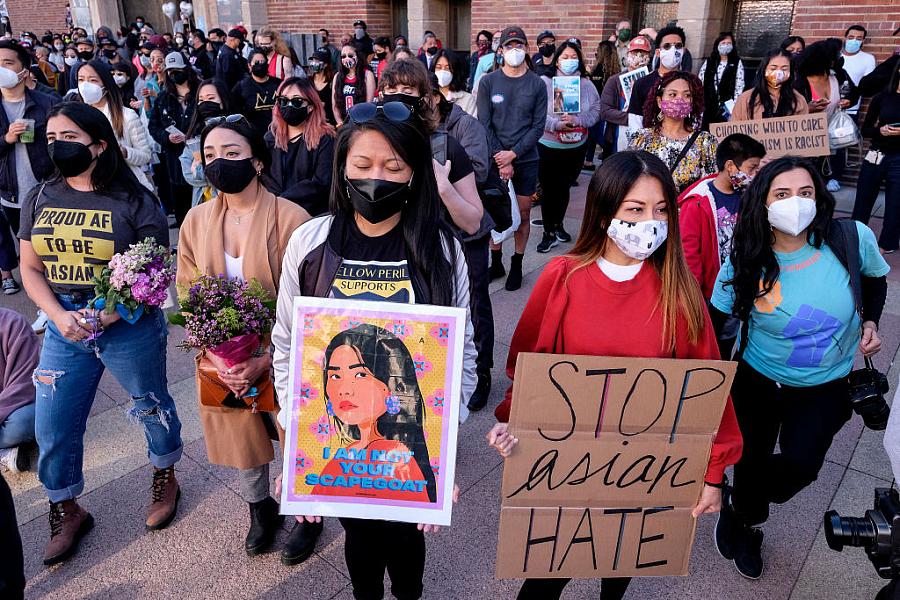Are the kids alright? New survey of Asian American youth seeks a more honest take

Demonstrators wearing face masks and holding signs take part in a rally to raise awareness of anti-Asian violence (Photo by RINGO CHIU/AFP via Getty Images)
The rise in anti-Asian hate crimes has felt personal to researchers Amy Nguyen and Jessie Chien. By the time newspapers displayed the names of the six Asian women who were killed during the Atlanta shootings in March, news of escalating violence against Asian Americans had been making headlines for months.
“The moment that Trump called COVID-19 the ‘China virus’ or the ‘Kung-Flu,’ it was fuel,” said Nguyen, a public health researcher at Darkness to Light, a nonprofit focused on child sex abuse. “It was just a matter of time before we saw people act out on it and show their true colors."
The shooting served as a catalyst that prompted the former grad school roommates to join other Asian American researchers to design and launch the Young Asian American Health Survey (YAAHS) in May, a collaborative effort they hope will bring the wellbeing and mental health of younger Asian Americans into the national conversation during a time of rising anxiety and fear.
Chien, Nguyen, and other researchers on the team drew from their own personal experiences facing discrimination in their childhood in crafting the survey, which asks a series of questions on family dynamics and perceptions on the rise in violence, to get a better sense of the factors shaping youth well-being during this chaotic time.
“I think the conversations that are being had around anti-Asian violence are very general,” said Chien, a doctoral student at the UCLA Fielding School of Public Health. “We want to know specifically how this age group is hearing about the violence, responding to it, thinking about it, and coping with it.”
Though the media has focused mostly on violence against elderly Asians, younger generations bear the burden of worrying about their older loved ones. Many are also facing their own mental health struggles, compounded by the loss of time spent with friends and the challenges of online learning. Social media can serve as a hub for connection and activism, but also relays hate, bullying, and misinformation at a time when young Asian Americans are trying to form their identity within an increasingly polarized country.
“Suicide is the leading cause of death among Asian Americans in this age group, so we're trying to understand what are some things that are contributing to that, especially given the pandemic,” said Chien. “You have the anti-Asian violence, but you also have the social isolation many families are facing and severe economic impacts from COVID-19. How does that reflect in in this generation’s mental health?”
Nguyen said the “model minority” myth makes it harder for young Asian Americans to admit when they’re struggling, or to feel like their problems are real in comparison to others. Those stereotypes and cultural stigma around sharing private burdens with outsiders could potentially skew research on how young Asian Americans are mentally faring during the pandemic. The YAAHS survey team hopes to avoid some of those pitfalls with carefully crafted questions that aim to really get at how people are faring.
For example, the survey asks several open-answer questions, acknowledging that multiple choice questions might not capture the nuance and diversity of experiences and feelings that participants want to share. The survey also asks questions regarding community resilience, to highlight the ways that young people are building community as a way to cope. (You can learn more about the survey’s method and approach here.)
“I think having a survey that's built specifically by the Asian American community for the Asian American community is big,” said Nguyen, adding that the team used their own experiences to craft each question in the survey. “Having the Asian American community step up and say we've been there, we care about you; I feel like that could really help that data gap.”
One of the main goals of the project is to capture data on different ethnicities within Asian American communities, since differences are often erased and disparate groups of people lumped together as simply “Asian.” The team also plans to eventually provide open access to the data, to help journalists, researchers and nonprofits better understand and advocate for Asian American mental health.
While there’s no official release date set for the data, the team hopes to post some early insights in the next two weeks or so, and hopefully release more results in September after an internal review of data quality.
To get the word out about the survey, the YAAHS research team drew from their combined network of Asian American researchers, authors, designers, and other influencers. In roughly a month, the survey has garnered more than 250 responses. They’re aiming to continue collecting surveys until late July, or until they reach their target sample size of 5,000 participants.
So far, respondents’ answers reveal fear and sadness, but also emotional burnout.
“As they grow up, many are living in three-generational households, and they’re in a stage where they kind of have this mutual exchange of care,” said Chien. “In the Asian community family is everything, and they're really fearful for their parents and grandparents in this context.”

